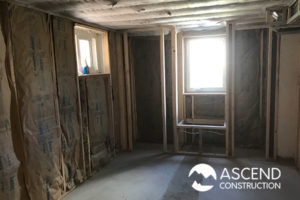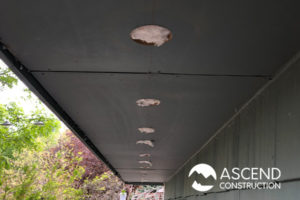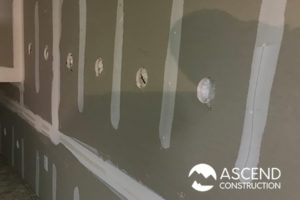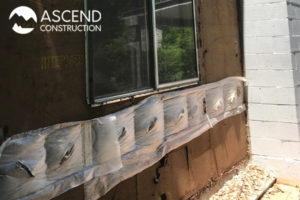Having the most comfortable Colorado home is largely dependent on a house that has properly insulated walls.
At Ascend Construction we offer a variety of cutting edge solutions to insulate your walls whether or not drywall is already installed.
Why Consider Improving Your Colorado Home's Wall Insulation?
REQUEST A FREE, NO-OBLIGATION QUOTE!
"*" indicates required fields
Prior Colorado Wall Insulation Installation Projects
Colorado Wall Insulation FAQs:
Wall Insulation Installation
Insulating the walls of your home not only helps with energy efficiency, and comfort but also cuts down on sound transfer from outside, giving comfort to your ears as well. Read more...
Wall Insulation In Colorado
Colorado Exterior Wall Insulation
Exterior wall insulation is crucial in keeping homeowners comfortable. This blocks noise from the outside. It makes the house conducive for work during the day and sleep during the night. The walls also help in managing indoor environmental conditions.
Proper exterior wall insulation installation is necessary to ensure maximum effectiveness. Installers must adhere to the local exterior wall insulation code. This sets the minimum level of insulation necessary to keep homes warm in the winter and prevent excessive heat in the summer. Different materials are available to make this happen, each having their own unique characteristics.
Exterior wall insulation code cost will depend on several factors including the surface area, the insulating material chosen, the initial repairs that require completion, and other factors that affect the complexity of the project. It is best to call a contractor to set an appointment. An onsite inspection will make it possible to come up with an accurate estimate. This is money well spent as excellent insulation improves energy efficiency and reduces utility bills.
Colorado Basement Wall Insulation
Basement walls may be isolated under the home but they still need insulation to regulate the temperature. This is particularly important if the basement is going to be converted into a living space or a storage space. The recommended basement wall insulation R-Value is 11 or higher for Colorado homes. Recommendations differ in every state.
Contractors can help homeowners determine the right basement wall insulation panels for their needs. They can discuss the pros and cons of each option so that people are empowered to make informed decisions. Moisture can seep into the walls from the surroundings. It is important to install a basement wall insulation vapor barrier as well. This will prevent damage from leaks and mold growth.
Wall Insulation R Value
The R Value is a measure of resistance to heat flow. This is also known as thermal resistance. A higher number signifies better ability to oppose the flow of heat. It means the sun's heat is less likely to penetrate the walls even during the hottest days of the year. This keeps the indoor temperature more bearable. When running an air conditioner, this helps reduce the stress on the cooling system to lower energy consumption and prolong the machine's lifespan.
In the winter, wall insulation keeps the home warm despite the freezing cold conditions outside. The recommended Colorado wall insulation R value considers the region's climate. Reputable installers stay true to the Colorado basement finishing codes to provide the best outcome for their clients.
Wall Insulation Types
There are different external wall insulation types with their own applications and installation methods. For example, blanket insulation such as fiberglass batt and mineral wool can go into unfinished walls between joists and studs. Blown-in fiberglass are great for hard-to-reach places and existing finished areas that require added insulation. Spray foam can also improve the thermal resistance of enclosed existing walls. Aside from walls, these are also used for floors, ceilings, attics, and basements. Contractors will offer their own solutions while explaining the advantages and disadvantages. It is best to get a wall insulation quote for each to see which ones can fit the budget.
Wall Installation FAQs
How much wall insulation do I need?
This will depend on several factors including the amount of insulation that is already present in the home. Installers will first make a thorough assessment of the walls to see their level of insulation, areas covered, and current condition. Homeowners can also provide information about their experience regarding indoor temperature and overall comfort. Building codes establish the insulation standard for different parts of the house in terms of the R Value. In Colorado, an R Value of 18 is the minimum for the exterior walls. If this feels inadequate, then installing more is possible for the benefit of the occupants.
What is the best wall insulation?
It depends. Each type of wall insulation has its own advantages and disadvantages. Consider the situation, the budget, the urgency, and other factors. For example, batts are easy to install and relatively inexpensive but their edges are prone to air gaps. Their R-value also goes down when compressed. Sprayed foam is more expensive but it can provide air sealing in addition to insulation. Blown-in insulation is somewhere in the middle with a reasonable price and limited air sealing capacity. However, this can settle over time resulting in a lower R-value. As you can see, there is no straightforward answer. A logical choice will emerge in every case after considering all relevant factors.
How much does wall insulation cost?
The cost of wall insulation will vary for each project. The choice of insulating material and the amount needed are some of the most crucial elements. Do not rely on estimates based on simple phone calls because these are unreliable. Ask a contractor to visit your home to discuss the extent of the work and get a more realistic estimate. Insist on written quotes instead of verbal declarations. This should contain the breakdown of the cost so that you can understand where your money is going. Ask about the warranty and method of payment as well.
How to install wall insulation with vapor barrier
The effectiveness of wall insulation can decrease over time due to moisture. Installing a vapor barrier can help prevent this. Before anything else, rainwater needs to flow away from the home through a good drainage system. The direction of the vapor barrier relative to the insulation will depend on the climate. To avoid condensation, this must point toward the warm side. In hot climates, the barrier should face the outside of the house. This blocks the humid outside air from the walls. In cold climates, it should point inside. For places where the seasonal swings in temperature are more pronounced, a compromise is necessary. The best contractors know exactly what to do in every situation. You can rely on them to install everything properly.
What To Expect With Wall Insulation Project From Ascend Construction
When working with Ascend Construction on your wall insulation project, your home will be in the best hands from design through implementation with our highly trained team of designers and technicians.
Insulating the walls in a home or building can be treated in a variety of ways. These options come down to the type of material desired. At Ascend, we offer the following services for insulating walls:
- Closed cavity dense packing
- Open cavity net and blow dense packing
- Spray foam insulation
- Batt insulation
Closed Cavity Dense Packing
Many older homes in Colorado are built with little to no insulation in the walls of your home. If it turns out you are in this scenario, fear not as insulation can be added without tearing open all of your walls. To do this, Ascend Construction will begin by drilling access holes into framing cavities around your home. This allows access to the open and uninsulated walls. We then utilize our specialty dense pack insulation equipment to fill the wall cavities with densely packed insulation. Upon completion of our work, all of the holes will be patched to their original form, leaving our only trace to be daily reminders of your newfound home comfort.
Open Cavity Net And Blow Dense Packing
New construction, as well as unfinished areas of homes, can utilize the quick and painless installation of net and blow dense packing.
Net and blow dense packing is completed by first stretching specialty insulation netting over the framing cavities insulation is needed in. This netting is then stapled tight across each framing stud member. Wall cavities are then filled with dense-packed insulation utilizing our insulation blowing equipment. Dense packing provides a benefit to traditional insulation installs as dense packing can fill all surrounding space of a framing cavity thus reducing air leakage.
Spray Foam Insulation
Spray foam insulation provides many benefits and can be utilized in many different ways to insulate walls. Spray foam provides the highest R-value per inch of insulation amongst other building materials, making it a good choice when space is limited.
Spray foam can also be used as an air or vapor barrier depending on the thickness it is sprayed. Spray foam can be applied to fill entire wall cavities or utilize a process called a “foam flash” aka “flash & batt”. A foam flash utilizes the air and moisture barrier properties of spray foam by spraying only a layer of foam into wall cavities, rather than filling the entire cavity. This then leaves the remainder of the framing cavity open to be filled with either dense packed insulation, or batt insulation.
This process requires strict attention to detail and proper cavity size planning to ensure accurate R-values are attained as well as design to properly account for engineered dew points.
Batt Insulation
Batt insulation comes in a variety of forms, which include mineral wool batts, denim batts, fiberglass batts & many more. Each product provides its own benefits and shortcomings and a call to Ascend can help work through which product is best for you.
When installing batt insulation, a common mistake made by industry professionals is installing batts that do not fit tightly in the framing cavity they are installed within. This is because batts are traditionally cut with handheld knives & cutting precision is limited.
At Ascend construction, we have solved this issue by utilizing only precision cutting equipment that removes the human error from the equation. This process helps give our development partners & residential customers a final product they can count on to meet their needs.
Whether the final intent of your project is to create a well-insulated space from outdoor temperatures, sound transfer, or to meet local building code, Ascend Construction can help formulate the perfect insulation design plan and implement it to the highest of standards.
We service the following towns and cities:
Click here for a complete listing of all the towns and cities we service in Colorado and Wyoming.




